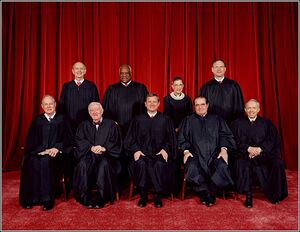UnNews:Supreme Court: "Students too stupid to know what they are saying."
| Straight talk, from straight faces | ✪ | UnNews | ✪ | Tuesday, November 5, 2024, 06:23:59 (UTC) |
| Supreme Court: "Students too stupid to know what they are saying." | 
|
27 June 2007

Washington - The US Supreme Court ruled against student speech in a 6-3 vote today. Asked to clarify in what context student speech could be restricted, the Court clarified, saying, "All of it."
"Students," Chief Justice John Roberts stated, "are too stupid to know what they are saying. Between smoking pot, having sex, and abortions, students have no brain capacity left to comprehend their own thoughts." Associate Justice Satan expressed that he had "been waiting a long time to screw more people out of their rights."
Associate Justices Ruth Bader Ginsburg, Steven G. Breyer, and David Souter opposed the majority ruling. In typical godless liberal fashion, their dissenting opinion whined nonstop about "Constitutionally protected rights" and that "Students' do not leave their rights behind at the schoolhouse gate." What a bunch of sore losers...
Lucifer brilliantly refuted their argument by pointing out that most schools in the United States do not have "gates", thus disqualifying the argument, as it clearly only applies to "gates" and not doors or parking lots.
In their majority opinion, the Justices' were unable to cite anything in the Constitution that supported their opinion, but they all heartily agreed that they were right, and not to worry about "silly little things like the Bill of Rights."
The Constitution was unavailable for comment, but the Declaration of Independence eagerly volunteered its own "inalienable right to life, liberty, and the pursuit of happiness," although the document admitted that it wasn't quite sure what this means.
Sources[edit]
- Ariane de Vogue "Supreme Court Rules Against 'Bong Hits 4 Jesus' Student". ABC News, June 25, 2007
